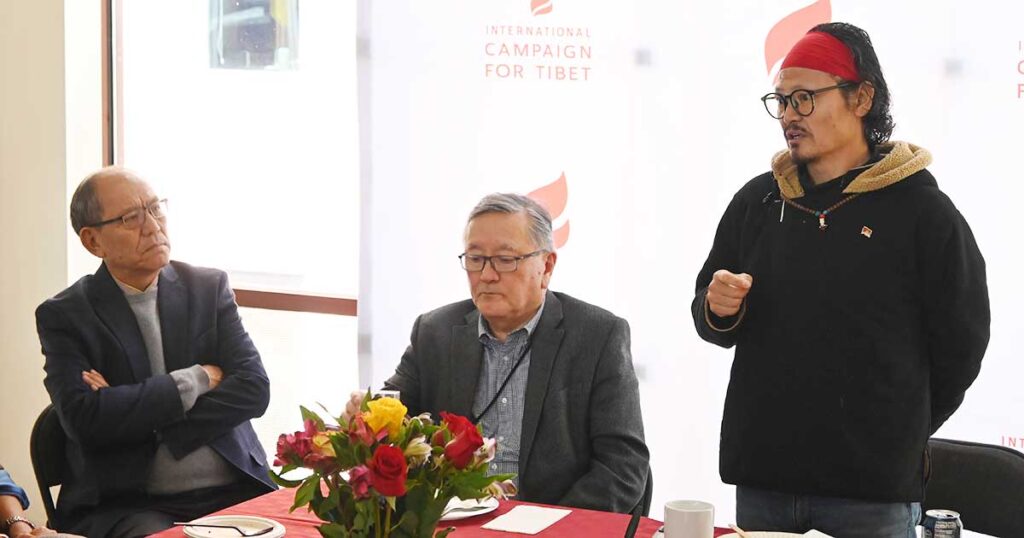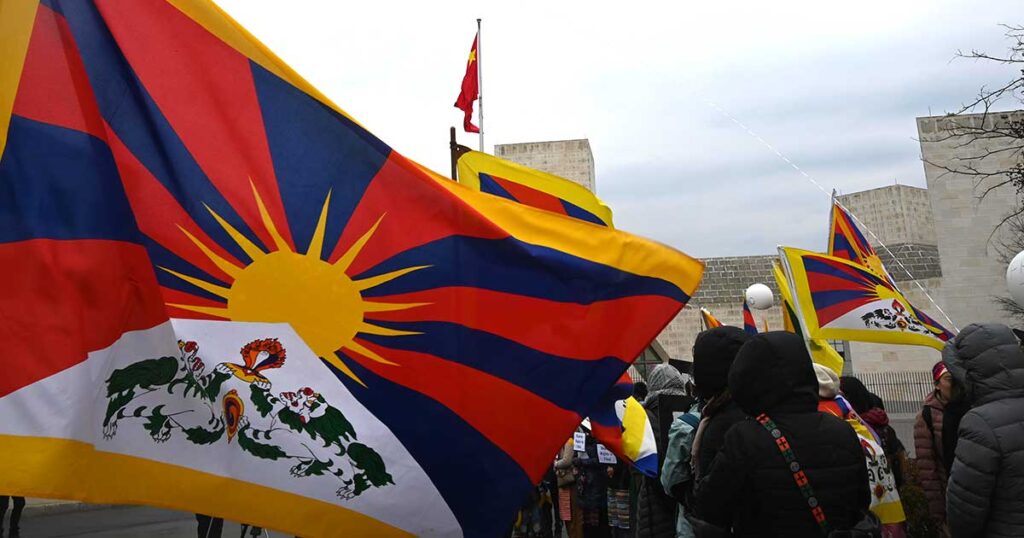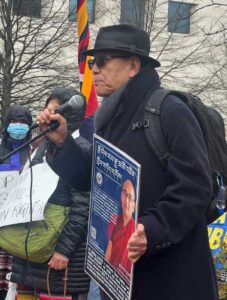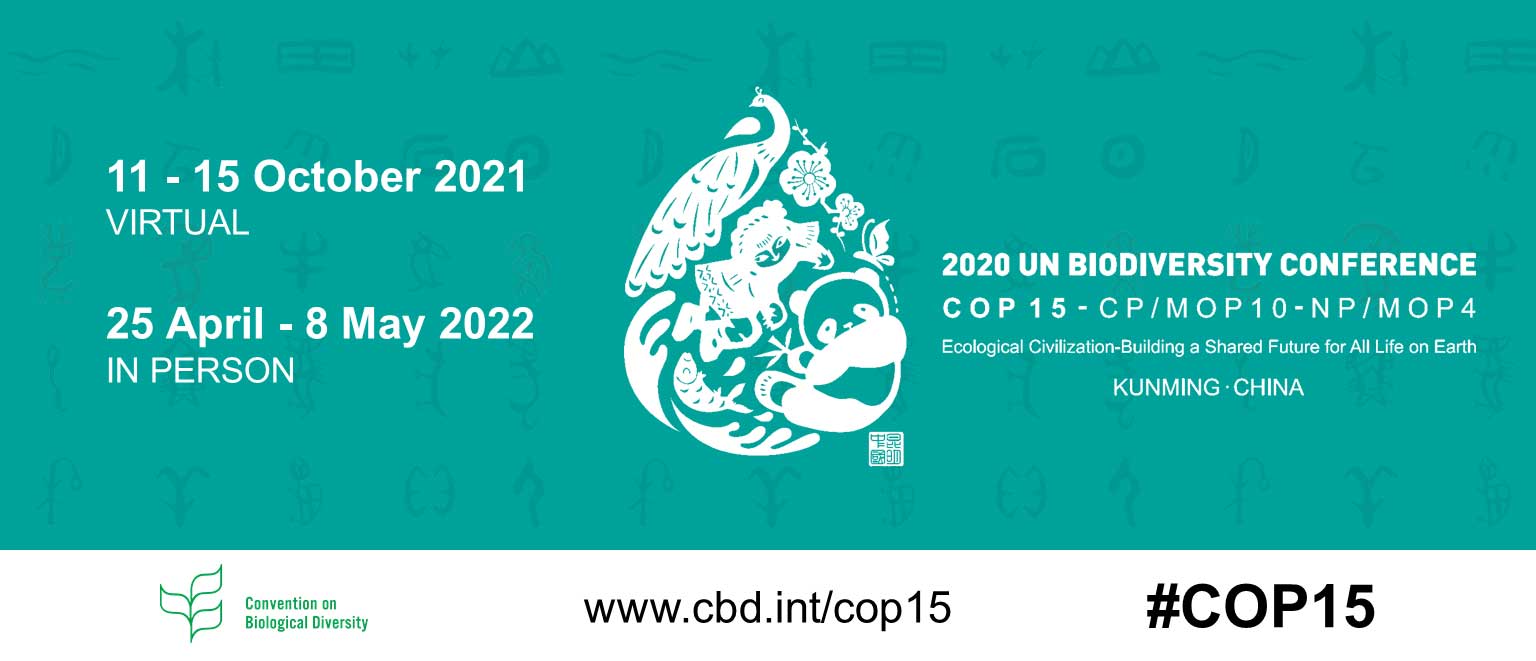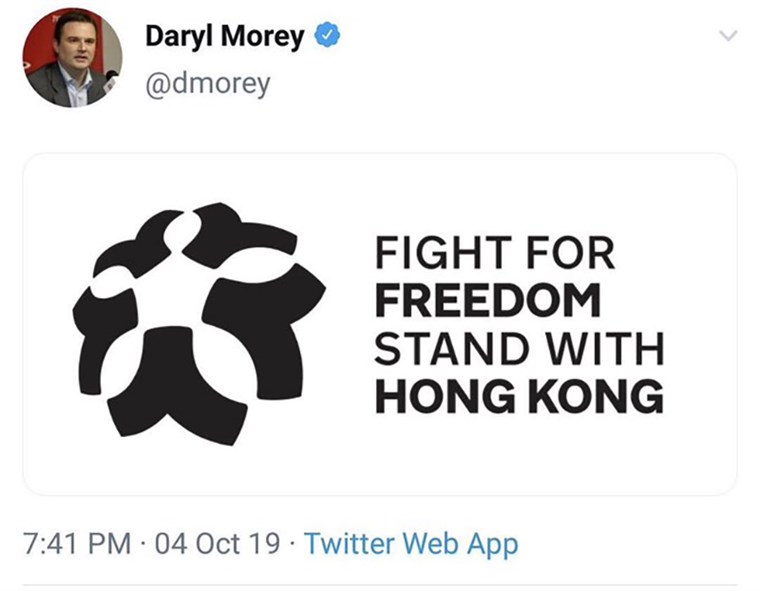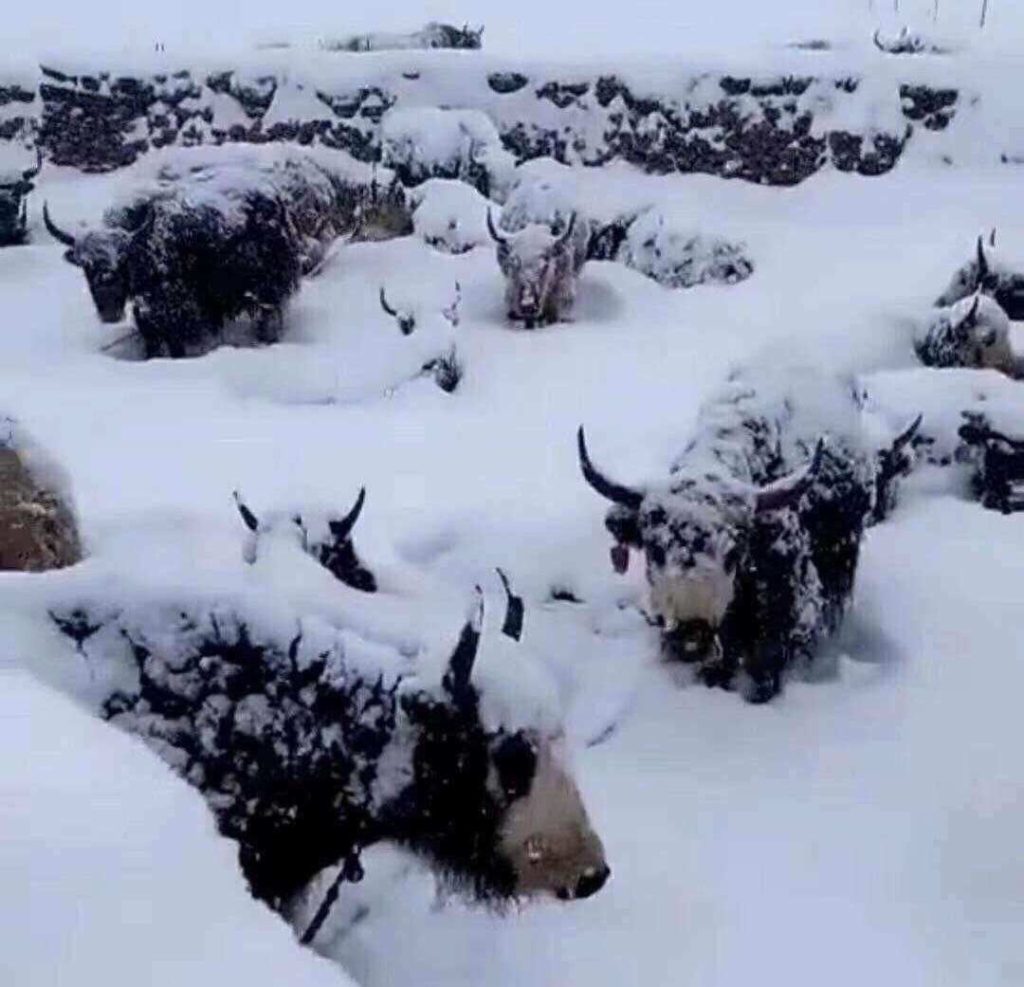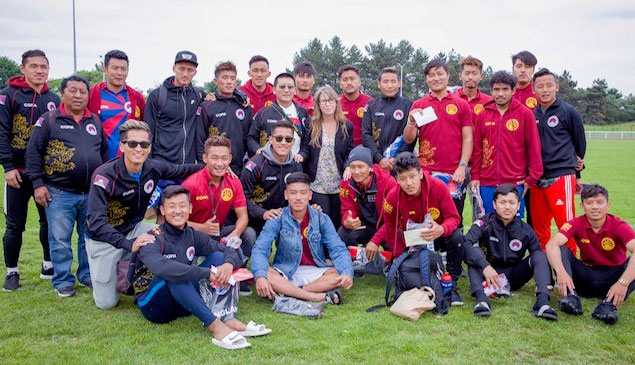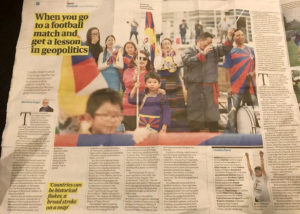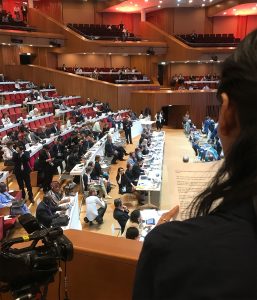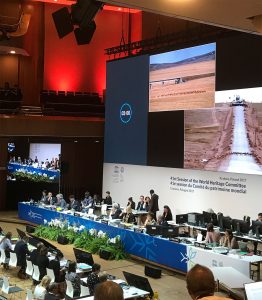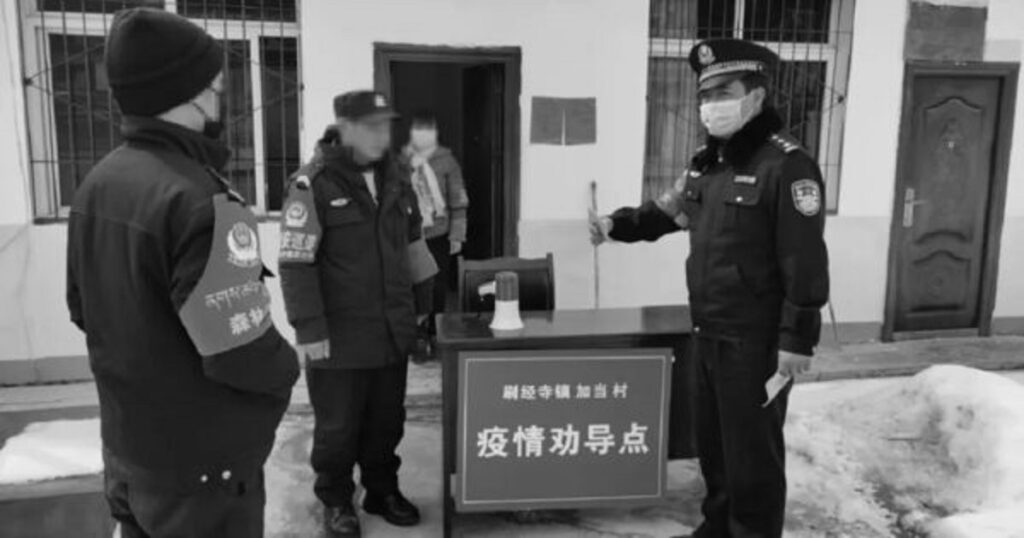
A photo of a Tibetan police officer (right) whom Chinese state media mysteriously claim died from “overwork” fighting the coronavirus outbreak in Tibet.
he coronavirus outbreak has tragically caught much of the world off guard. But knowing the Chinese government’s repression in Tibet, I’m not at all surprised by how this pandemic spread.
Instead, I’m outraged.
A lot of disinformation is now percolating about the roots of our current global crisis, both because Chinese officials are deliberately trying to confuse the issue, and because some outside China are helping them deny the blame. So let’s be clear about what happened.
In December, laboratories in the central Chinese city of Wuhan identified the emergence of the new virus. But rather than act decisively to prevent it from mushrooming, Chinese authorities ordered the scientists to stop their tests and destroy the samples.
That was hardly all. Chinese police also detained a young doctor who warned his colleagues about the dawning outbreak. That young man later died of COVID-19, the disease the coronavirus causes (more on that below).
Chinese state-controlled media avoided discussing the topic for weeks. The Chinese government denied to the World Health Organization that the coronavirus spreads from human to human. And Chinese officials allowed a potluck banquet for tens of thousands in Wuhan to go forward as planned.
Now, with the number of deaths mounting across the globe, China is taking a bow on the world stage, claiming it has wrestled the coronavirus into submission and flaunting offers to help countries still under siege. Yet this narrative conveniently leaves out the part at the beginning where Beijing dumped Pandora’s box on all of humanity.
The reality is this: According to a University of Southampton study, if the Chinese government had acted to combat the coronavirus three weeks earlier than it did, it could have reduced COVID-19 cases by 95 percent.
Instead, Chinese authorities spent that time bullying, deceiving and denying, and as of today, the virus has reportedly infected more than 1.3 million people worldwide—although the real number is almost certainly larger, in part because Beijing is likely underreporting cases in China, and because too few people have access to testing here in the United States and elsewhere.
Whatever the figure is, it doesn’t begin to convey the holistic toll of the outbreak: the jobs lost, the families separated, the communities broken, the traumas inflicted, the civil liberties expunged and the lives forever worsened.
So for whatever bouquets people want to give Beijing for its eventual performance in controlling the outbreak, they must also lay the blame at its feet for exposing the world to this debilitating crisis in the first place.
And the next time the Chinese government claims its actions in Tibet are of no concern to the global community, we should all remember that the duplicity and malignancy of this regime have the horrifying power to bring our entire world to a crashing halt.
Same story in Tibet
If you’re a Tibet supporter like I am, you’ve seen this movie before. Only it’s not “Outbreak” or “Contagion.” Instead it’s a documentary about the Chinese government’s long-running, ideologically driven ineptitude.
I mentioned earlier Li Wenliang, the heroic physician who became world-famous after police interrogated and threatened him over a post he made on the messaging app WeChat about a possible new viral outbreak.
Li and I were born the same year—but the big difference between us is that he’s now dead. The courageous doctor died after police reproached him for “disturbing the social order” and he returned to work, only to contract the virus the officials compelled him to deny.
From my perch at the International Campaign for Tibet, I recognized the Kafkaesque nature of Li’s story immediately, because I’ve seen it so often in Tibet, which China has brutally occupied for more than six decades.
Four years ago, police in Tibet arrested businessman Tashi Wangchuk after he appeared in a New York Times video calling for the protection of Tibetans’ native language. In the video, Tashi travels to Beijing, where he tried to file a lawsuit requiring officials to improve Tibetan-language instruction in his home city of Yushu.
Under China’s constitution, ethnic minorities have the right to use their mother tongue, and Tashi says explicitly in the video that he wanted to “try to use the People’s Republic of China’s laws to solve the problem.”
Despite this, in 2018, a court in Yushu handed him a five-year prison sentence. ICT later translated his court documents, which reveal his prosecution to be a sham and his confession to be the result of possible torture. (One can only imagine what authorities would have done to Dr. Li had he been ethnically Tibetan rather than Chinese.)
I automatically thought of Tashi when I first heard of the ordeals Li faced before his tragic death. Although the details differ, the pattern is largely the same. Both men tried to draw attention to an issue of public concern. Both attempted to act according to the law. Both were careful and measured. And for their troubles, both were detained and accused of undermining society.
Now, Tashi is languishing in prison, while Li has become just another of the more than 76,000 people around the world known to have died so far from the disease his government punished him for warning people about.
Sick regime
Of course, I don’t believe the Chinese government is solely to blame for our current peril. Governments across the world have failed to prove themselves capable during this crisis. You are unlikely to hear me utter a word in defense of our own country’s ill-prepared and inadequate response, and I am continuously appalled by a system that favors profits over public health and people’s welfare.
And yet, having worked at ICT since 2018, I cannot get over how the denialism and pathology I’ve observed in Tibet during that time have now helped unleash this scourge on the entire planet. (I don’t think I’ve felt this angry since the 2008 financial crisis, which also had a rotten belief system as a primary cause.) More importantly, I think we would be derelict if we failed to hold the Chinese government accountable for its catalyzing role in this disaster.
I can’t make the point any better than Kapil Komireddi does in the British news outlet The Critic, so I will simply share his words: “The calamity unfolding all around us did not emerge from a void. It originated in China. And its eruption into a global pandemic is inseparable from the nature of the regime that has ruled China since 1949.”
I won’t claim to be an expert on the Chinese government after less than two years in this field. But I do sense that the Chinese Communist Party is obsessed with staying in power above all else and views any potential challenge—including the coronavirus—through that lens.
Chinese officials often cast peaceful protest and cultural expression by Tibetans as threats to social stability (and therefore a threat to the government’s continued rule). They reacted to the coronavirus the same blinkered way but found that an infectious disease is not as easy to suppress as nonviolent resistance.
Despite my familiarity with China’s institutional irrationality, I hoped somewhere in the back of my mind that it would respond to its failures with some much-warranted humility. Unsurprisingly, that has not proven to be the case. In the midst of this crisis that it helped spawn, the CCP has only doubled down on its routine of praising itself while throwing elbows at its geopolitical rivals, especially the United States.
Perhaps the most outlandish part of that effort has been the claim by Chinese officials that the US army introduced the coronavirus to Wuhan during a visit in October. Although that’s blatant demagoguery, Beijing has gone even further in using the pandemic to attack Americans, with a state media article in March implying that China could halt its export of pharmaceutical ingredients to the United States, which would cause the country to “fall into the hell of a novel coronavirus epidemic.”
Last month, China announced it would expel US journalists from The New York Times, The Wall Street Journal and The Washington Post and subject those three outlets, along with Time and Voice of America, to increased red tape. The Chinese Foreign Ministry claimed this was retaliation against the US decision to decrease the number of Chinese state media journalists allowed to work in the United States.
But China’s action was a major escalation, not an equivalent response. Even worse, it promises to increase the Chinese government’s lack of transparency after that lack of transparency enabled the coronavirus to spread.
Inoculated from criticism
For me personally, one of the most confounding parts of this pandemic has been the accusations of racism. It has been heartbreaking to see bigots in the United States and other parts of the world target people of Chinese and East and Southeast Asian descent for violence and intimidation. The thought of students facing bullying in their schools saddens me in particular. I was in high school during 9/11 with
brown skin and a foreign-sounding name, so I understand the fear and self-consciousness racial profiling can bring, and I don’t wish that on anyone.
Speaking only for myself, I think it’s a mistake to refer to the coronavirus as “the Chinese virus” or “the Chinese coronavirus,” because doing so seems likely to provide grist for anti-Asian xenophobes, which is too serious a risk to ignore. But it would also be a mistake to let the Chinese government off the hook for its inciting role in this outbreak.
Indeed, Beijing seems more than happy to use accusations of bigotry to inoculate itself from judgment. For instance, when Nobel Prize-winning Peruvian author Mario Vargas Llosa wrote a column about the pandemic stating that, “none of this could have happened in the world if popular China was a free country and democratic rather than a dictatorship,” the Chinese embassy to Peru accused him of making “discriminatory and defamatory statements”—a charge that deliberately conflates criticism of the Chinese government with racism toward the Chinese people.
Similarly, Chinese Foreign Ministry Spokesperson Geng Shuang—the bane of my existence in my work as ICT’s communication officer—urged Llosa to “discard his prejudice and look at the issue in an all-round, correct manner.” What that “correct manner” is is apparently up to Beijing to decide and the rest of us to adhere to.
Sadly, some seemingly well-meaning people are playing into Beijing’s hands, allowing their commendable aversion to racism to distract from the Chinese government’s misdeeds. Especially perplexing to me is a “Late Night with Seth Meyers” segment in which the host—whose humor I often enjoy—appears to brush off criticism of the Chinese government as racist, then almost immediately pivots to using a mock Italian accent to talk about the coronavirus in Italy. I’m not claiming the experience of Italians and Europeans in the modern world is precisely the same as that of Asians. But I still find the whiplash reasoning of that segment hard to believe.
I’ve also seen some commentators suggest that looking back at how this pandemic began is a waste of time now that we’re in the middle of it, and that we should focus more on criticizing our own government than on criticizing China’s. With all due respect to the people who hold those views, I think we can do more than one thing at a time.
We can confront the crisis we have on our hands while leaving space to figure out how it could have been prevented in the first place. We can (and should) demand more from our own leaders—indeed, I’m sure many of you will feel the criticisms I make of Beijing in this piece also apply to Washington, DC—while demanding greater transparency and respect for whistleblowers in China. And we can oppose the authoritarian blundering of the Chinese government while recognizing that governments and people are not the same thing.
Continued oppression in Tibet
We’ll get no help in that last effort, however, from the Chinese government itself, which is more than content to paint any criticism of its repressive system as a hate-fueled attack on Chinese people themselves. But that red-herring maneuver is a bit much coming from a regime that has built an entire colonial apparatus in Tibet based on the racist idea that Tibetans are culturally inferior and deserve to live as second-class to China’s Han majority.
Even since the coronavirus outbreak set in, the Chinese government has kept up its repression of the Tibetan people. As with Dr. Li, police have cracked down on Tibetan netizens who make statements about the outbreak, including a man named Tse from the city of Chamdo (Chinese: Changdu), who posted a message on WeChat urging people to recite a prayer in order to ward off infection. For that spiritual sin, he was given seven days in administrative detention.
There was also a strange report in state media claiming a Tibetan police officer died from “overwork” fighting the outbreak. The report, which fails to explain why the officer was overworking and whether it was voluntary, appears to be yet another attempt by the Chinese government to falsely depict Tibetans as loyal to the Communist Party and its bankrupt ideology.
Despite the dangers of spreading the virus, Chinese officials in January said they were moving ahead with a new campaign in Tibet described as a “million police entering 10 million homes,” which involves police “visiting the people, resolving people’s concerns, resolving conflicts, preventing risks, investigating problems and controlling chaos.”
In contrast to the Chinese government’s predictably heavy-handed response, Tibetans have reacted to the coronavirus with compassion. Inside Tibet, Tibetan Buddhist monasteries have donated money for the purchase of facemasks and other urgently needed supplies. Kumbum monastery in the region of Amdo contributed 1 million yuan to Wuhan.
In exile, His Holiness the Dalai Lama responded to requests from people around the world by sharing a message offering comfort and strength to all of us as we struggle through this pandemic. And here in the United States, Tibetan American medical professionals are fighting the virus on the frontlines, including 400-500 brave nurses in New York City, the new epicenter of the outbreak.
Interdependent world
For millennia, Buddhism has taught that all of our lives are interdependent, and today, that lesson is more obvious than it has been at any other time since most of us were born.
It seems likely to me that even after this pandemic ends, our world will remain different for the foreseeable future. Already we’re seeing democracies collapse, inequality grow, mass surveillance expand and industries die out. Even for those of us who never get infected, the trauma of losing loved ones, not to mention the hardship of rebuilding our communities, won’t soon fade.
But as bleak as the future might look, I still hope that at least some positive changes will emerge. Perhaps we will come to a better understanding that individual health quickly scales up to public health. Maybe we’ll start to take climate change more seriously. It’s possible we’ll even see a renewal of compassion and solidarity.
But wherever we go from here, we should never again accept the Chinese government’s claim that its decisions don’t involve the rest of the world. That notion is now invalid forever.
In the case of Tibet, China has proven it can’t be trusted to govern the country as a responsible member of the international community. Although the situation in Tibet may not cause the same global shock waves the coronavirus has, the boiling unrest there will certainly have spillover effects into the surrounding region and even farther afield, especially if Chinese officials pursue their unconscionable plan to appoint the next Dalai Lama.
For years, Beijing has said its oppression in Tibet is a domestic issue that foreigners have no right to get involved in. That never made sense, since Tibet has never truly been part of China. But in the wake of the coronavirus, all of us should make it clear to Chinese leaders that they don’t get to use that excuse anymore.
